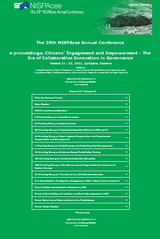EVENTS from Other Institutions
New Work @EIPA: Healthy Leadership, Healthy Employees and Resilient Organisation
Wellbeing at Work
October 21, 2021 - October 22, 2021
Venue: Online
Organizer(s): European Institute of Public Administration (EIPA)
Language: English
Contact: Programme Organiser
Ms Belinda Vetter
Tel: + 31 43 3296382
b.vetter@eipa.eu
Info link: https://www.eipa.eu/product/healthy-leadership-healthy-employees-resilient-organisations/
Individualisation in HR management will increase. Lifelong learning and the personal responsibility of employees for their own development are bringing change to HR management. Employability – skills, health and employee engagement – must be promoted at every phase of life. Attractive offers are desirable not only as part of recruitment (employer branding), but as part of employee retention as well. Good working relationships and conditions offer accompanying incentives, including those with a view to employee retention. Well-being in the workplace and life balance also become more important in the intergenerational perspective.
The coronavirus pandemic in particular has created uncertainty, mental strain and differences of opinion in society as well as among workforces (death of family members, existential fears in some cases, multiple stresses in home offices, attitudes towards vaccines). As a result, the orientation and communication requirements on managers and HR management have increased. The requirements for employee-focused leadership are increasing.
The role of manager will be decisive in determining the success or failure of the (digital) transformation in the world of work. Transformational, inspirational or even employee-focused leadership has long been a topic of discussion, and is only increasing in relevance. The attitudes and mindsets of the workforce need to be shaped. Employees need to be inspired to accept new things and thus to embrace processes of change in order to ensure the enduring implementation of reforms.
Managers are currently having to cope with the crisis, a challenge that is also seeing them act as role models. Over the past year, virtual leadership or ‘remote leadership’ has turned into a challenge overnight, as homeworking has increased. In times of crisis, and in view of increasing flexibility in working times and places of work, trust and control through goals, traditional management structures and time measurement systems have begun to partly replace previous patterns (control mechanisms). New forms of cooperation and collaboration need to be promoted and managed virtually, fears need to be minimised, resilience (including your own) needs to be strengthened, and communication needs to be encouraged. Within this, the personal responsibility of employees can be relied upon.
A range of experiences is relevant to the reorientation of leadership development moving forward. Agile structures are likely to become the new normal, as well as aspects of Work 4.0 and New Work. The next generation of managers needs to be adequately prepared. In addition to the development of skills and promoting engagement, health promotion that is geared towards prevention is increasing in importance – also when it comes to employer attractiveness. With mental health in mind, it is important to configure good working relationships and conditions. Good leadership and collaboration as well as a working environment characterised by appreciation are becoming key areas for action within today’s health strategies in administration. Physical health and resilience (both individual and organisational) are slowly becoming core issues, especially within the context of absenteeism in public administration.
Course methodology and highlights
We believe that learning happens best with practical knowledge, learning from the best but also learning from failures and exchanging experiences with peers. So this course includes:
extensive insights with multiple examples and real-life cases;
inputs from experienced practitioners from the private and public sector – scientists to learn from empirical findings as the basis for discussion among participants about the practical demands.




 Price:
Price: 









